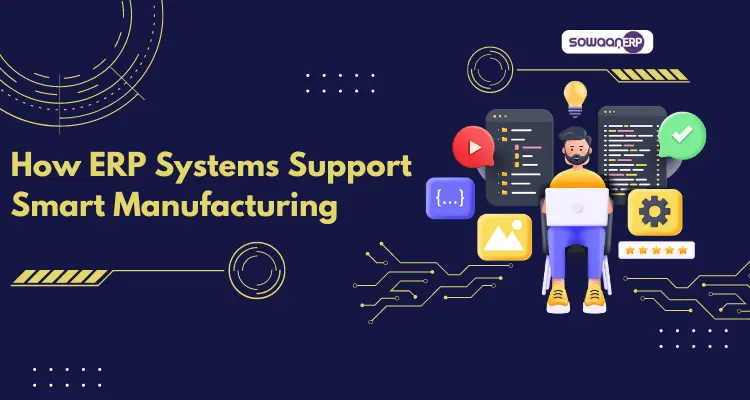
The Fourth Industrial Revolution, also known as Industry 4.0, is transforming the manufacturing landscape by integrating advanced technologies such as the Internet of Things (IoT), Artificial Intelligence (AI), and robotics into traditional production processes. To remain competitive in this era of rapid technological advancements, manufacturers must embrace smart solutions, including Cloud Based ERP Software in Pakistan such as SowaanERP. This blog will explore how ERP systems support smart manufacturing and help businesses thrive in the age of Industry 4.0.
Benefits of Cloud Based ERP Software in Pakistan for Smart Manufacturing
Enhanced Data Management and Analytics
One of the key drivers of Industry 4.0 is the ability to collect, analyze, and utilize massive amounts of data generated from various sources across the manufacturing process. Cloud Based ERP Software plays a critical role in managing this data, providing businesses with a centralized platform to store, process, and analyze information in real-time.
Real-Time Decision Making
By leveraging the power of data analytics, Cloud Based ERP Software in Pakistan enables manufacturers to make informed decisions based on accurate and up-to-date information. This allows businesses to optimize production processes, reduce waste, improve efficiency, and ultimately increase profitability.
Seamless Integration with Advanced Technologies
To fully embrace Industry 4.0, manufacturers must integrate advanced technologies such as IoT, AI, and robotics into their operations. Cloud Based ERP Software is designed to seamlessly integrate with these technologies, allowing businesses to automate tasks, enhance productivity, and boost innovation.
Streamlined Automation and Robotics
Cloud-based ERP solutions can be easily integrated with robotic systems and automated machinery, streamlining the flow of information between different components of the manufacturing process. This ensures that production lines run smoothly and efficiently, minimizing downtime and maximizing output.
Improved Resource Management
One of the primary benefits of Cloud Based ERP solution is its ability to optimize resource management. By providing a centralized platform for tracking and managing resources such as raw materials, labor, and equipment, businesses can better allocate resources, reduce waste, and improve overall efficiency.
Enhanced Collaboration and Communication
Cloud-based ERP systems facilitate improved collaboration and communication among different departments and teams. By providing real-time access to critical information, employees can work together more effectively, resulting in streamlined processes and faster decision-making.
Increased Agility and Responsiveness
In the fast-paced world of smart manufacturing, businesses must be agile and responsive to stay ahead of the competition. Cloud Based ERP Software allows manufacturers to quickly adapt to changes in the market, customer demands, or production requirements, ensuring that they remain competitive in the Industry 4.0 landscape.
Cost-Effectiveness and Reduced IT Burden
Cloud-based ERP solutions often have a lower total cost of ownership compared to traditional on-premise systems. With a subscription-based pricing model, businesses can avoid high upfront costs and ongoing maintenance expenses. Additionally, cloud-based ERP systems reduce the IT burden, as the vendor is responsible for software updates, security, and server management, allowing internal IT teams to focus on more strategic initiatives.
Enhanced Security and Compliance
Data security is a top priority for many manufacturers. Cloud-based ERP vendors typically invest heavily in state-of-the-art security measures, ensuring that sensitive business data is protected from unauthorized access and potential breaches. Furthermore, these systems can support compliance with industry regulations and standards, such as GDPR, HIPAA, and ISO certifications, providing peace of mind for businesses dealing with sensitive information.
Buy Cloud Based ERP Software in Pakistan: Factors to Consider
When looking to invest in Cloud Based ERP Software, there are several factors to consider:
- Scalability: Choose a solution that can grow with your business and adapt to changing market conditions.
- Integration: Look for a system that can seamlessly integrate with advanced technologies such as IoT, AI, and robotics.
- Security: Ensure that the solution provides robust security measures to protect sensitive data and comply with industry standards.
- Customizability: Opt for a system that can be tailored to meet the unique needs of your manufacturing processes.
Comparison of Cloud Based ERP Software in Pakistan for Smart Manufacturing
When comparing different ERP solutions, it’s essential to consider factors such as functionality, scalability, integration capabilities, and pricing. By thoroughly evaluating each solution and weighing the pros and cons, businesses can make an informed decision and choose the best ERP system to support their smart manufacturing initiatives. Additionally, it’s crucial to assess the vendor’s reputation, customer support, and commitment to innovation, ensuring that the chosen solution remains relevant and continues to deliver value in the long run. By selecting the right cloud-based ERP system, organizations can maximize their return on investment and unlock the full potential of smart manufacturing technologies.
ConclusionEmbracing Industry 4.0 and implementing Cloud Based ERP Software in Pakistan can provide numerous benefits for businesses in the manufacturing sector. By enhancing collaboration, improving resource management, and increasing agility, organizations can better respond to market shifts and customer demands. Furthermore, the scalability and cost-effectiveness of cloud-based ERP solutions make them an attractive choice for businesses of all sizes. Ultimately, embracing these innovative technologies will empower manufacturers to drive growth, optimize operations, and achieve long-term success in the world of smart manufacturing.
